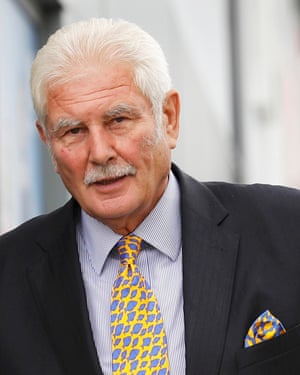Sports Direct has lost its biggest independent investor as some fund managers fear the crisis-hit retailer is incapable of addressing its corporate governance issues.
The Guardian has learned Standard Life, the largest independent investor at last year’s annual meeting, has bailed out of the stock, selling its entire 5.8% holding, and Aviva said it had sold down its stake.
Both had been vocal critics of the firm, which on Thursday released its annual report before the annual meeting next month.
The future of chairman Keith Hellawell hangs in the balance after he promised to step down if most of the minority shareholders did not back his re-election.
In January, 54% of independent shareholders failed to reappoint the former West Yorkshire chief constable, the second time they had voted against him in four months. He was saved by the support of the Sports Direct founder and chief executive, Mike Ashley.
Investors have expressed concerns over the dominance of Ashley, the firm’s excessive pay rewards, and poor treatment of workers.
One fund management firm, which did not want to be named, said: “We are concerned about the direction of travel at the firm and what will happen next.”
A Sports Direct spokesman declined to comment on Standard Life selling its stake.
However, the annual report shows Sports Direct has taken a series of steps to address its problems.
Staff are now able to give feedback online and flag issues of concern. “All contributions received are read by senior management,” the annual report says. “Improvements as a result of this dialogue include changes to working arrangements, free wifi in canteens and the introduction of English lessons.”

Sports Direct employs a large number of workers at its main Shirebrook warehouse who do not have English as their first language.
Its staff forum has been replaced by a “listening group” that consists of workers drawn from Shirebrook. Management attend monthly meetings during which there is an open forum including matters raised by agency employees.
It is also launching a health and wellbeing service for staff. This comes after 110 ambulances or paramedic cars were dispatched to the Shirebrook between January 2013 and April 2016, with 50 cases classified as life-threatening.
A Guardian investigation in 2015 prompted a parliamentary inquiry last year, in which MPs likened the depot to a Victorian workhouse.
The annual report says: “This will facilitate a health worker providing training for a team of our people who will become welfare guardians for their fellow staff. The past two years have been tough on our people and protecting our people remains a priority.”
The firm has also been working with Derbyshire police to provide advice over anti-drug policies and anti-hate crime initiatives.
Hellawell said: “We have made positive progress across the business as we continue to strive to ensure that all our people are treated with dignity and respect.
“FY17 has been a transitional year for the company and for our people. It is my firm belief that Sports Direct is a company of which Britain can rightly feel very proud.
“I hope that the progress we have made over the last 12 months will be taken into account by shareholders prior to the next shareholder vote at our AGM in 2017.”
It was enough to impress one investor, who said: “They have made great strides but there is only so much you can do in 12 months.”
The report also lists a range of risks that could harm the business. Ashley is defending the business from cyber-attacks with “external penetration testing” and on Brexit he has begun “negotiations with lenders” and is monitoring “movements in customer behaviour”.



